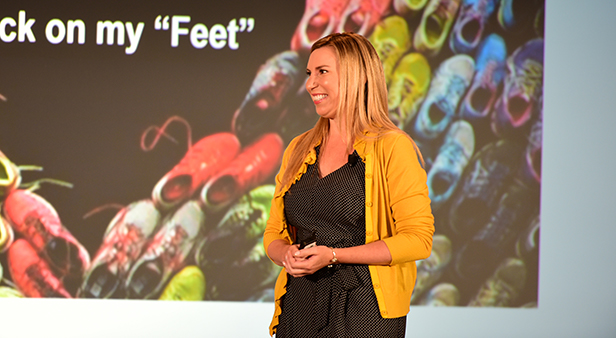July 10, 2019
Boston Marathon Bombing Survivor Shares Her Inspiring Recovery Story
Heather Abbott spoke Wednesday at the ASI Show Chicago.
Heading up to Boston for Marathon Monday was an annual tradition for Heather Abbott and her friends. They would watch the Red Sox play, then go to the finish line to cheer on the runners as they completed their 26.2-mile treks.
So, as it happened, she was there six years ago when terrorists set off two homemade pressure cooker bombs near the finish line. “I remember hearing the first of the two explosions,” the Rhode Island woman told a rapt audience at the ASI Show Chicago motivational breakfast on Wednesday morning. "You could see smoke in the air."
Video
ASI's Theresa Hegel interviews Boston Marathon-bombing survivor Heather Abbott.
Twelve seconds later, the second bomb went off. Abbott was catapulted into a nearby restaurant. She came to and saw people running away frantically and realized that her leg was too damaged to allow her to do the same. “I remember seeing blood and glass shattered all around me,” she said. “I remember thinking I might die right there.”
Luckily, someone stopped to help Abbott and get her to an ambulance. In the hospital, however, Abbott learned that her left leg would never be the same. “My best chance of having an active lifestyle would be to have my leg amputated,” she said.
Keeping the leg would have meant she would never be able to walk long distances or run or even wear cute shoes again. For the avid paddle boarder and high heel aficionado, that was unacceptable. “Amputation sounds like a difficult choice to make, but when it’s put in those terms, it wasn’t that difficult,” Abbott said.
Fortunately, her road to recovery was quicker than one might expect. She was fitted for a prosthetic leg and back to work as a human resources manager within four months of her injury.

Heather Abbott speaks at ASI Chicago.
Abbott attributes her recovery to three factors. “The first key was to accept what I couldn’t change and to move forward,” she said. Initially, Abbott asked a lot of “Why me?” and “What if?” questions until she “began to realize that there were no answers to those questions.” After accepting that fact, Abbott was able to start asking questions about what she could and should be doing with her future. She spoke with military veterans and even a “Real Housewife” (Aviva Drescher of New York) about living with amputation and the prosthetic options available. Abbott now has four prosthetic legs, with options that allow her to paddle board, run and wear her beloved heels.
The second recovery factor was allowing herself to rely on other people’s support – a difficult task for someone who relished her independence. Support came in many different forms, from Abbott’s mother who moved back in with her to financial assistance from the Boston One Fund (which raised around $80 million for bombing victims).
The third key to Abbott’s recovery was “finding an opportunity to pay it forward.” Every year, 185,000 people in the U.S. have a limb amputated. There are about 2.1 million people living with a lost limb right now, but that number is expected to double by 2050, Abbott said. Prosthetic limbs range wildly in price, anywhere from $5,000 to over $100,000. The appendages need to be replaced every few years due to wear and tear. Insurance companies typically only cover the most rudimentary of models, deeming limbs that allow the wearer to put on heels or participate in athletics as “not medically necessary.”
Abbott said she was lucky to receive all the financial support after the bombing, but other people who lose limbs don’t always have that same chance. That’s why she started the Heather Abbott Foundation to raise funds for customized prostheses for those who have suffered limb loss after traumatic circumstances. In the last four and a half years, the foundation has raised more than $1 million and given out 28 prosthetic limbs. “We’ve really had the opportunity to make a difference in people’s lives,” Abbott said.
Though Abbott’s circumstances are unique, she believes her path to recovery holds wisdom for people struggling with any kind of difficulty. “Adversity comes into all over our lives at one point or another in different forms,” Abbott said. “We have to find a way to get through it. … Adversity is opportunity in disguise. I try to focus on positive ways that losing my leg has changed my life.”
